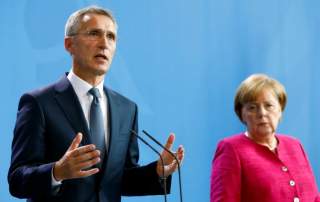NATO’s German Problem: Who Needs Soldiers or Weapons?
Europeans should not rely on Americans to spend, fight, and die for them.
Even those NATO members located further east have little to fear. From attacking the Baltic States, Moscow would gain little other than some wrecked real estate. Poland would be indigestible. Even President Donald Trump could not easily ignore explicit treaty obligations to defend these nations, creating great risk for Russia. Although angry at America and Europe for violating promises not to expand the alliance to its borders, Moscow nevertheless looks cautious and practical, most interested in preventing the addition of Georgia and Ukraine to the transatlantic alliance.
Second, the Europeans, including residents of Germany, rely on America to do their military dirty work. Until now Washington always did what was expected, spending more, increasing commitments of manpower and materiel, and reassuring allies. However unsettling the president’s rhetoric to the European consensus, his aides have carried on policy as usual. So why would any rational European politician propose a major increase in military outlays?
Washington’s preferences have had little impact on Europe’s behavior. For years presidents, secretaries of defense, secretaries of state, and other officials have demanded, begged, insisted, requested, whined, and urged NATO’s European members to do more. Nevertheless, as a percentage of GDP, the continent’s military expenditures remain below those of seven years ago. That number fell to 1.4 percent in 2014; it was only slightly higher 1.47 percent last year. Primary responsibility for that increase is Russia’s aggressive behavior toward Ukraine, which sparked a slight bump in allied expenditures. Additionally, that increase started well before President Trump took office. But, as in the case of Germany, it is unlikely to go much higher.
The only policy change which would make a difference is for the United States to end Europe’s military dependency and turn responsibility for Europe’s defense over to Europe. With ten times the economic strength and four times the population of Russia, the continent is well able to defend itself. European governments then could spend as much or as little as desired on the military, free of hectoring by Washington.
America and Europe still could cooperate militarily on shared interests. Should an unexpected hegemonic threat arise, the United States could reengage. But after seventy years of NATO, the American people should declare their work in Europe done. It is time for the Europeans to take over responsibility for their security.
Doug Bandow is a senior fellow at the Cato Institute. He is a former special assistant to President Ronald Reagan and the author of several books, including Foreign Follies: America’s New Global Empire.
Image: Reuters

